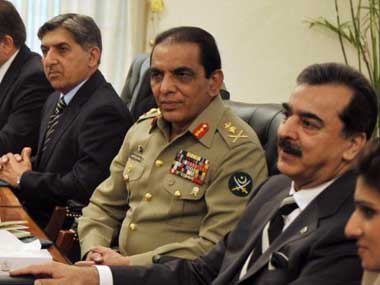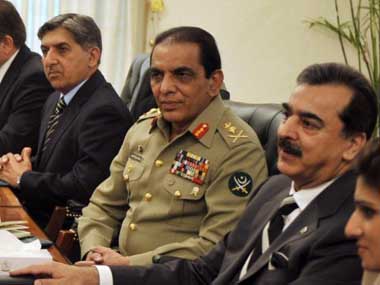In Norse mythology, the story is told of
King Hogni’s sword
which, once drawn, could never be sheathed without securing a kill To give that metaphor a modern-day twist, one that would be more familiar to Pakistan’s generals, once the pin is removed from a grenade, the explosive cannot be defused. [caption id=“attachment_182661” align=“alignleft” width=“380” caption=“Gilani oozed goodwill and charm, even going so far as to praise the army’s role in preserving the nation’s security: AFP”]
 [/caption] Pakistan Prime Minister Yousaf Raza Gilani is now engaged in a desperate effort to dial back his civilian government’s ‘war’ with the Pakistani military and the ISI. The man who had, only the other day, virtually accused the Army-ISI establishment of working like a lawless “state within a state”, is now looking to calm the same military nerves he had frayed. On Saturday, at a meeting of the Defence Committee of the Cabinet, Gilani oozed goodwill and charm, even going so far as to praise the army’s role in preserving the nation’s security, and saying he wished to avoid a collision with men in uniform. So keen was the civilian government to send out a message of reconciliation, that it invited – for the first time ever at a meeting of the Defence Committee – the state broadcaster to telecast Gilani’s olive-branch oration. Earlier in the day, Pakistan’s Army chief, Gen Asfaq Pervez Kayani called on President Asif Ali Zardari, evidently to give expression to the Pakistan army’s sense of anguish – and anger - at being vilified thus by the civilian administration. On Saturday, senior military sources planted stories in the media suggesting that Kayani was “furious” with Gilani for his statements criticising the army and wanted them to be withdrawn – or at least clarified. Reuters reports, quoting an unnamed army source that “the army chief complained to the president about the prime minister’s statements”, which were “divisive and made the country more vulnerable.” This morning, Zardari’s office is working overtime to deny that report, saying it was “based on speculation”. It’s never a good sign when the chief executive’s office is caught up in a “battle of press releases” barely a day after the civilian government went on a charm offensive intended to disarm the military. But as one of Pakistan’s most reputed journalists, Najam Sethi, says, the army is in no mood to concede an inch – and Kayani himself is under pressure from senior military commanders to stand up against the perceived slight to the army’s honour embodied in Gilani’s criticism. And although that resentment isn’t about to find expression in a full-blown coup – which is in itself quite a telling comment on the evolution of the Pakistani state over the decades – it is utter folly to expect the army to crawl back into its barracks and lick its wounds. Quite simply, there are many more ways in which the Pakistan army can today extract blood – without firing a single shot. As journalist Cyril Almeida notes in Dawn, Kayani isn’t known for “frontal assault”, and his retaliatory response is more likely to find expression in delivering “death by a thousand cuts”. And today, the civilian government has pretty close to a thousand gaping wounds – and its calculations that it can fend off the slow-bleed are seriously flawed. The hunted government, he reckons, is being lulled into a false sense of security. And even within the civilian government, it isn’t as if there is perfect unanimity of approach. There is, for instance, increasing speculation that Zardari may, at a pinch and as a desperate attempt at survival, offer Gilani’s head as the blood price. (Chatter has it that PPP leader and senior lawyer Aitzas Ahsan is a likely successor, although there has been all-round denial of this.) But even that may be inadequate blood price for the army and the ISI. After all, when King Hogni’s sword has been unsheathed and is fated to inflict death, merely drawing a pint of blood is inadequate reward. One way or another, a ‘killing’ is inevitable..
[/caption] Pakistan Prime Minister Yousaf Raza Gilani is now engaged in a desperate effort to dial back his civilian government’s ‘war’ with the Pakistani military and the ISI. The man who had, only the other day, virtually accused the Army-ISI establishment of working like a lawless “state within a state”, is now looking to calm the same military nerves he had frayed. On Saturday, at a meeting of the Defence Committee of the Cabinet, Gilani oozed goodwill and charm, even going so far as to praise the army’s role in preserving the nation’s security, and saying he wished to avoid a collision with men in uniform. So keen was the civilian government to send out a message of reconciliation, that it invited – for the first time ever at a meeting of the Defence Committee – the state broadcaster to telecast Gilani’s olive-branch oration. Earlier in the day, Pakistan’s Army chief, Gen Asfaq Pervez Kayani called on President Asif Ali Zardari, evidently to give expression to the Pakistan army’s sense of anguish – and anger - at being vilified thus by the civilian administration. On Saturday, senior military sources planted stories in the media suggesting that Kayani was “furious” with Gilani for his statements criticising the army and wanted them to be withdrawn – or at least clarified. Reuters reports, quoting an unnamed army source that “the army chief complained to the president about the prime minister’s statements”, which were “divisive and made the country more vulnerable.” This morning, Zardari’s office is working overtime to deny that report, saying it was “based on speculation”. It’s never a good sign when the chief executive’s office is caught up in a “battle of press releases” barely a day after the civilian government went on a charm offensive intended to disarm the military. But as one of Pakistan’s most reputed journalists, Najam Sethi, says, the army is in no mood to concede an inch – and Kayani himself is under pressure from senior military commanders to stand up against the perceived slight to the army’s honour embodied in Gilani’s criticism. And although that resentment isn’t about to find expression in a full-blown coup – which is in itself quite a telling comment on the evolution of the Pakistani state over the decades – it is utter folly to expect the army to crawl back into its barracks and lick its wounds. Quite simply, there are many more ways in which the Pakistan army can today extract blood – without firing a single shot. As journalist Cyril Almeida notes in Dawn, Kayani isn’t known for “frontal assault”, and his retaliatory response is more likely to find expression in delivering “death by a thousand cuts”. And today, the civilian government has pretty close to a thousand gaping wounds – and its calculations that it can fend off the slow-bleed are seriously flawed. The hunted government, he reckons, is being lulled into a false sense of security. And even within the civilian government, it isn’t as if there is perfect unanimity of approach. There is, for instance, increasing speculation that Zardari may, at a pinch and as a desperate attempt at survival, offer Gilani’s head as the blood price. (Chatter has it that PPP leader and senior lawyer Aitzas Ahsan is a likely successor, although there has been all-round denial of this.) But even that may be inadequate blood price for the army and the ISI. After all, when King Hogni’s sword has been unsheathed and is fated to inflict death, merely drawing a pint of blood is inadequate reward. One way or another, a ‘killing’ is inevitable..
Venky Vembu attained his first Fifteen Minutes of Fame in 1984, on the threshold of his career, when paparazzi pictures of him with Maneka Gandhi were splashed in the world media under the mischievous tag ‘International Affairs’. But that’s a story he’s saving up for his memoirs… Over 25 years, Venky worked in The Indian Express, Frontline newsmagazine, Outlook Money and DNA, before joining FirstPost ahead of its launch. Additionally, he has been published, at various times, in, among other publications, The Times of India, Hindustan Times, Outlook, and Outlook Traveller.
)